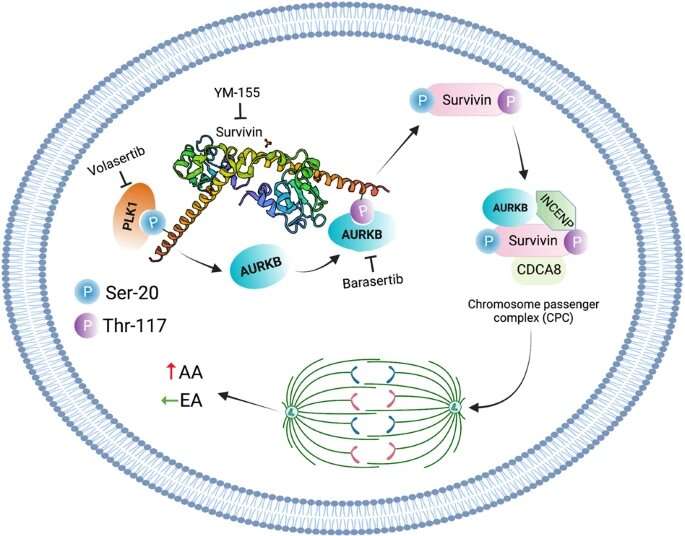This article has been reviewed according to Science X's editorial process and policies. Editors have highlighted the following attributes while ensuring the content's credibility:
fact-checked
trusted source
proofread
Study identifies a potential therapeutic target for triple-negative breast cancer in Black patients

A new study published in the journal Cell Death & Disease by researchers at the University of Alabama at Birmingham has identified a potential therapeutic target for triple-negative breast cancer, or TNBC, an aggressive treatment-resistant breast cancer subtype that disproportionately affects Black women.
This novel study offers a previously unrecognized lens to evaluate disparate racial burden in TNBC. The research team found that post-translational modifications, or PTMs, such as phosphorylation may drive proliferation and tumor growth disparately and contribute to differences in racially distinct TNBC.
The study looked at two proteins, PLK1 and AURKB, which are often overexpressed in TNBC, an aggressive type of breast cancer. These proteins help regulate how fast cancer cells grow and divide by regulating the activation of a proliferation-promoting protein called survivin through phosphorylation.
The researchers found that Black women with TNBC had higher levels of PLK1 and AURKB compared to European American, or EA, women with TNBC. Although total survivin levels were similar between the two groups, the research team showed that activated (phosphorylated) survivin levels were higher in Black women than in EA women with TNBC.
"Black women are disproportionally affected by TNBC, treatment options for which remain limited," said Ritu Aneja, Ph.D., professor and associate dean for Research and Innovation at the UAB School of Health Professions, and the corresponding author of the study.
"Our findings suggest that pharmacological inhibition of PLK1 and AURKB may be a viable therapeutic option for Black women with TNBC. This is the first study to show a mechanistic basis of racial disparity in an aggressive form of breast cancer and opens a new avenue for the investigation of the biological basis of racial disparities."
The researchers provide the precise molecular mechanism of higher proliferation of Black women with TNBC through the unusual lens of PTM. The research team showed that racial differences in the levels of PLK1 and AURKB contributed to the higher levels of phosphorylated survivin and faster proliferation of TNBC cells in Blacks compared to those in EA women.
Notably, pharmacological inhibition of both PLK1 and AURKB reduced tumor proliferation significantly in xenograft mice models bearing Black TNBC tumors than those bearing EA TNBC tumors.
By understanding the role of PTMs, scientists may be able to develop new treatments that can target them and reduce proliferation of TNBC cells. This study highlights the importance of understanding beyond the central dogma of molecular biology to help develop personalized treatments for TNBC patients.
Chakravarthy Garlapati and Shriya Joshi are lead authors of the paper.
More information: Chakravarthy Garlapati et al, PLK1 and AURKB phosphorylate survivin differentially to affect proliferation in racially distinct triple-negative breast cancer, Cell Death & Disease (2023). DOI: 10.1038/s41419-022-05539-5
















